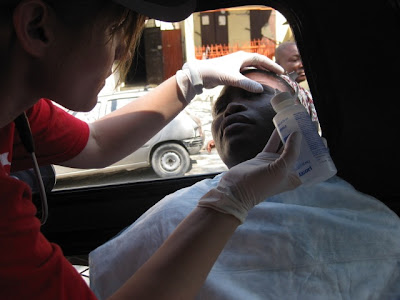We no longer have clinic on Sunday afternoons. Initially the medical need was so critical that clinics, ours and those run by other relief organizations, ran seven days a week from dusk to dawn. Though our staff attends church service with our translators and our patients Sunday mornings, the clinic is now closed on Sunday afternoon. The founder of the
Heart to Heart International (the humanitarian organization we are working with), Dr. Gary Morsch, joked with our clinic director,
"Who decided we weren't working on Sundays anymore?".
"God", Dr. Spaulding responded. "He wanted all of us to have a day of rest".
We are fortunate to have the founder of Heart to Heart back in Haiti for a few days during our time here. Dr. Morsch was initially to Haiti three days after the earthquake assessing need and planning operations to meet that need. Sunday after church, he offered to take us around Port-au-Prince, to share with us what he knew of Haitian culture, and to allow us to witness the full magnitude of the earthquake's destruction. While we could see the ruins of the National Cathedral outside our clinic windows, Sunday was the first time we saw the devestation of the Palace, the courts, the nursing school, the national hospital and pharmacy, and countless other cultural landmarks.
We walked the two blocks from the clinic to the Cathedral. Our first stop was at the ruins of a building next to the clinic. Scattered amongst the rubble were clothes, plastic flowers, and human bones. It was jarring. All streets are lined with fallen debris that has been pushed into seemingly monotonous piles of concrete. But if you look closely, you see personal affects, the materials of everyday living, and the remains of those who perished.
We walked on in near silence to the National Cathedral*, which was a notable and beautiful landmark. (About 80% of Haitians practice Catholism.) Dr. Morsch, who is a retired marine, took us perhaps a little farther into the rubble than common sense might allow, but this site drew us in. As I dusted underneath my feet, a beautiful marble floor emerged. To my left, a baptismal basin sat askew. Priest's vestments, one in black, one in white, laid amongst the twisted metal, chunks of concrete, and shattered stained glass. The archbishop was killed in the cathedral the day of the quake.




From this sobering site, we took the Tap-tap (so named bc you "tap" it when you want it to go or stop) downtown to the Palace and National Hospital. On our way there, we stopped at the nursing school. The quake happened during class session. Many, many died. It was chilling to see medical supplies, notebooks, shoes, and other affects. Though like before, most chilling was to see the scattered bones of those who died just six weeks ago. The devastation is so great, with 90% of structures in rubble, that there is not the man power to remove rubble and retrieve remains in a timely fashion. Approximately 240,000 of those who perished are already in mass graves. The death count from the quake is surely double, triple this, when you consider the many whose bones remain amidst the debris. The downed school across from our clinic holds the bodies of 200 children. We said a prayer for the nurses, and all of Haiti's people, and moved on.

We finished up the day at a missionary school that was having debris cleared by 120 college students, mostly from the University of Miami, who came in for a weekend to help clean up. The man who coordinated the students' efforts, was a friend to Dr. Morsch's brother,
Paul Till. While there we spoke with a woman from Vermont who has been teaching at the school for 11 years. Her apartment was on the upper floor, towards the back of the building. It came down in the earthquake. We asked her about the quake, what she had experienced. So many talk about how loud it was. The first thing you heard was the noise, they all say. But this woman added another dimension to our understanding of the quake. While the noise of the earth rumbled for 35 seconds, the wailing of the people lasted for hours: There was an incessant loud wail of unimaginable human anguish throughout the streets for two to three hours after the earthquake struck.
From this conversation, I now know that the memory of this wailing, the participation in this wailing, is part of what my patients bear. Part of what spurs their headaches, their stomachaches, their inability to sleep at night.
~Maryclaire
p.s. More to come tomorrow from Aaron on our second day of Mobile Clinic.
*p.s.s. To see pictures of the Cathedral, the palace and other landmarks pre and post earthquake, please go
here.
 On our last day of mobile clinic, the taptap pulled away from the curb after we had sent the septic two-month-old baby to the hospital. Over a dozen people were still waiting to be seen. I knew they would be seen by my colleagues the following day. But still, I couldn't keep from having to wipe away my own tears, as these beautiful people became smaller in the distance.
On our last day of mobile clinic, the taptap pulled away from the curb after we had sent the septic two-month-old baby to the hospital. Over a dozen people were still waiting to be seen. I knew they would be seen by my colleagues the following day. But still, I couldn't keep from having to wipe away my own tears, as these beautiful people became smaller in the distance.









































